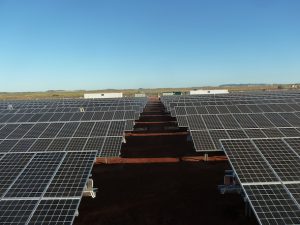
Chinese electric vehicle and battery manufacturing giant BYD has set its sights on Australia’s home battery storage market, pitting its lithium-iron phosphate B-Box portfolio against the offerings of rival market players including Tesla, Sonnen and LG Chem.
The suite of home modular energy storage products was launched on the Australian market in February this year, but BYD – which is listed on both the Hong Kong and Shenzhen stock exchanges, and boasts US investment guru Warren Buffett among its key shareholders – used last week’s All-Energy Australia conference and exhibition to “consolidate” its presence in a market many are tipping to be among the world’s biggest, once it takes off.
“Europe …is an existing and stable market for us, but Australia is the most important emerging market to BYD,” said the company’s director of global battery sales, Julia Chen, in an interview with One Step Off The Grid at All-Energy.
The main reasons for this, said Chen, were the 1.7 million rooftops with PV already installed, as well as falling solar feed-in tariffs, and high electricity prices.
“There are a lot of reasons (for Australian home owners) to consider storage,” Chen said. “And as manufacturer or batteries, we wish to (offer) a reliable battery with cost effective options to make storage affordable.”
Certainly, BYD has scale on its side. The company has a major share of the global rechargeable lithium battery market and also is the world’s biggest manufacturer of hybrid and pure electric vehicles.
BYD’s B-Box systems are also modular and scaleable, upwards from 2.5kWh to 442kWh, allowing consumers to increase the capacity their system to meet different energy storage requirements. It also allows home owners to add battery storage in stages, as a way of mitigating cost, which remains prohibitively high, for the moment.
Certainly, the company sees this capacity flexibility as an asset, particularly against a certain un-named “major competitor” that BYD noted in a media statement “only reaches 13.5kWh with a large-sized system,” while B-Box can be kept small, or scaled up to suit light commercial uses.
BYD is also keen to push the reliability and safety of its battery products, which Chen notes have been driving around in their tens-of-thousands in cars, buses and taxis in China for seven years now, without incident.
“We use the same battery for our railway systems and for our buses,” she told One Step. “For more than seven years they have been in electric buses and taxis, running every day.” The company also offers a 10 year warranty on its battery products.
Chen says BYD has made several submissions to Standards Australia, to help shape its battery installation guidelines, which earlier this year threatened to ban lithium batteries from being installed inside homes and garages, due to a perceived safety threat.
“There are a lot more of these batteries in cars than in (homes),” she said. “And we have not had a single incident.
“These restrictions, which would be for lithium batteries only, would limit the home battery storage market,” Chen said of the proposed standard, which since looks to have been scrapped. “We see a strong trend that the lithium battery will take the lead in (home) energy storage, and not lead acid.”
Focusing back on the Australian market, Chen says she believes her company has the right product portfolio to meet on and off-grid demand, for both residential and commercial customers.
“Since we launched here only seven months ago we have worked to consolidate our presence by appointing key distributors around the country to give us good national coverage.
“We have received strong interest from solar energy installers,” she said.
This article was originally published on RenewEconomy’s sister site, One Step Off The Grid, which focuses on customer experience with distributed generation. To sign up to One Step’s free weekly newsletter, please click here.







